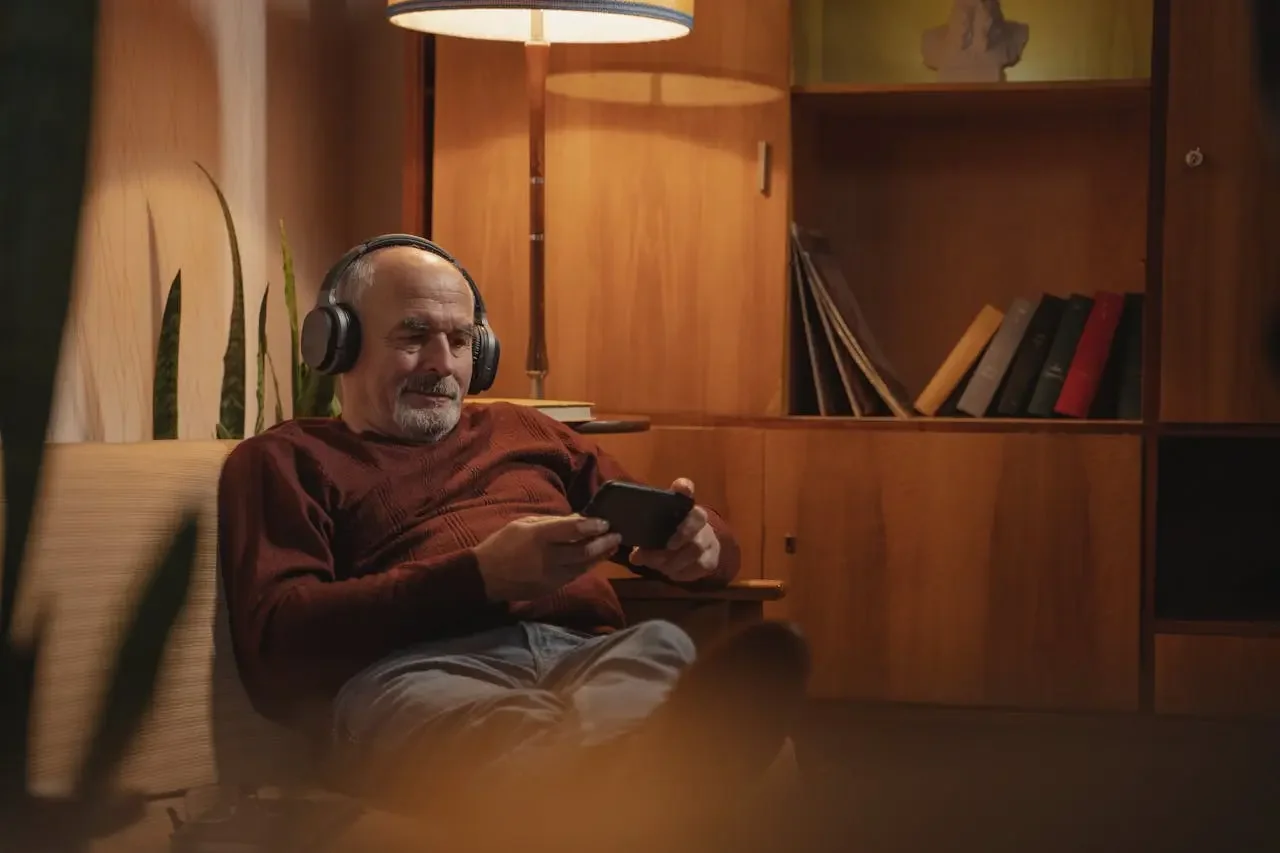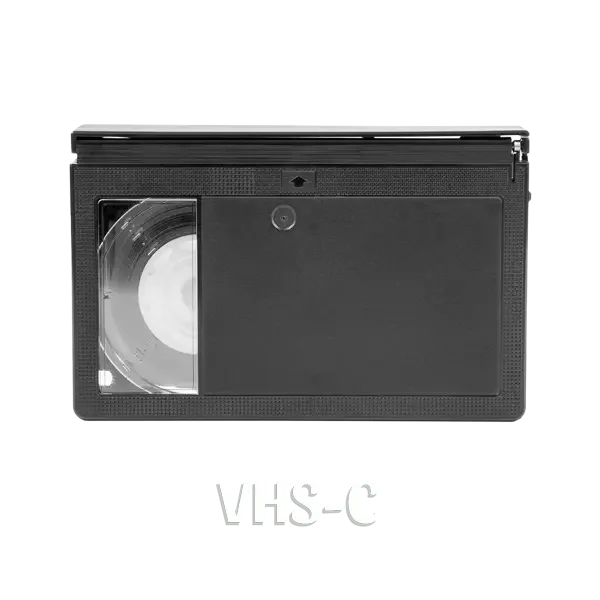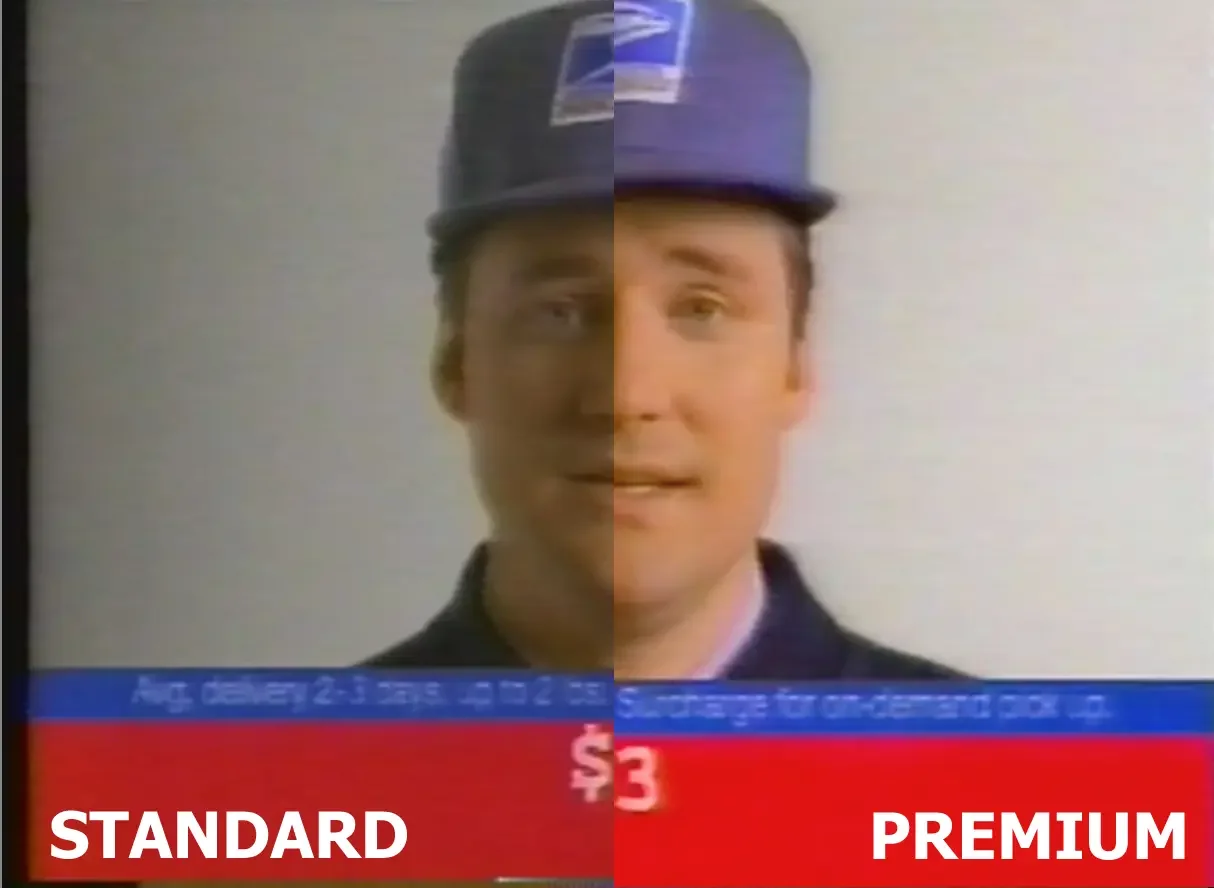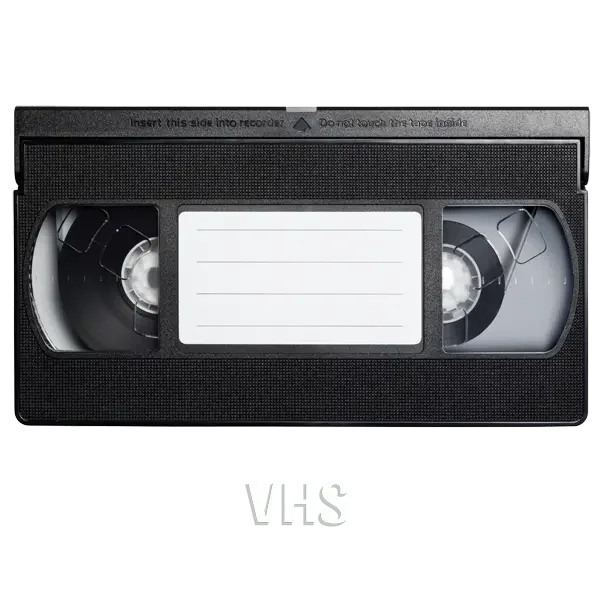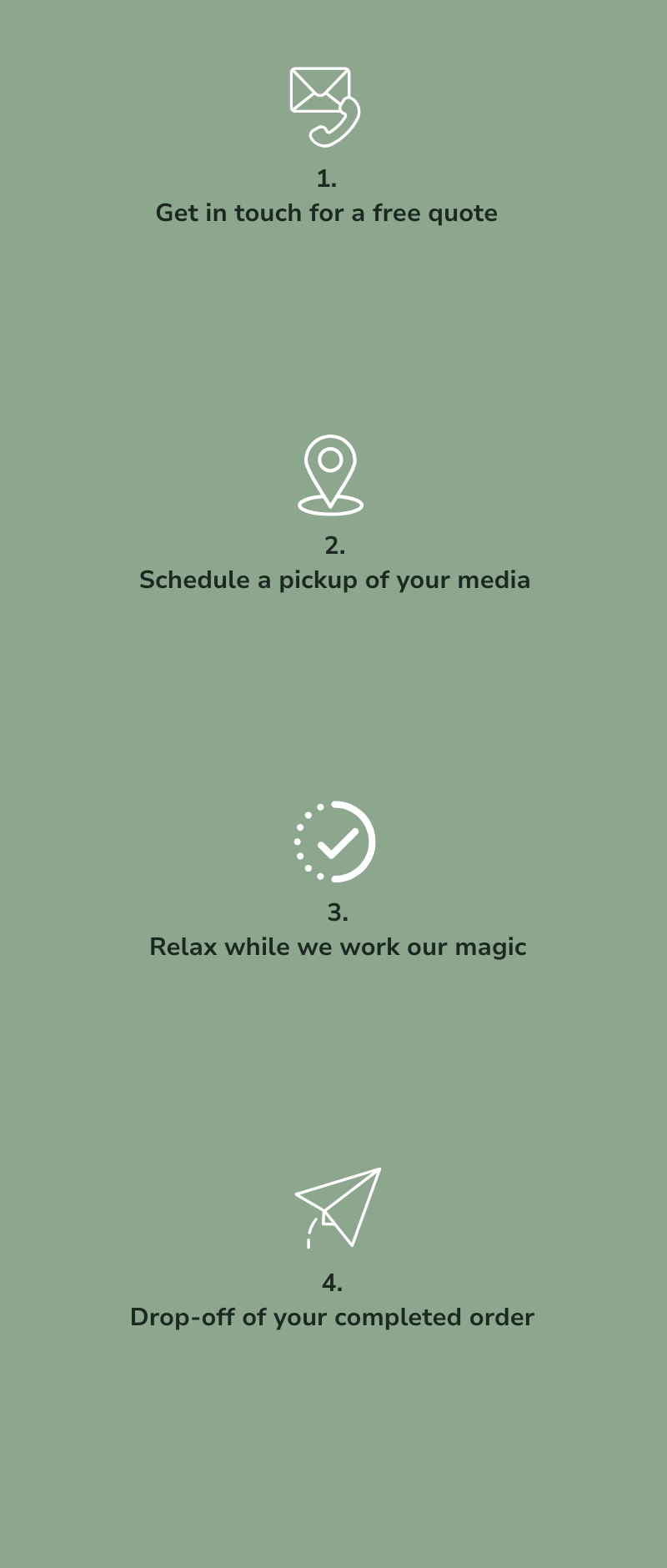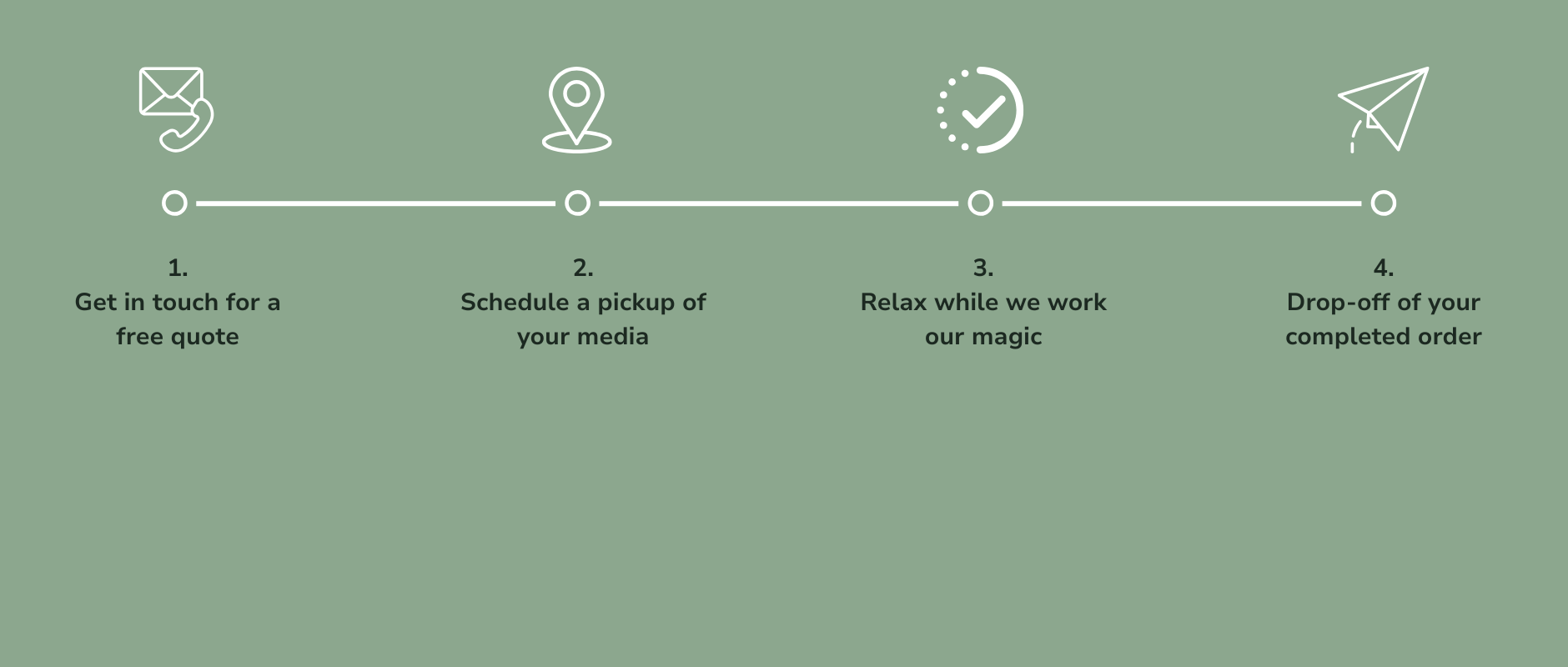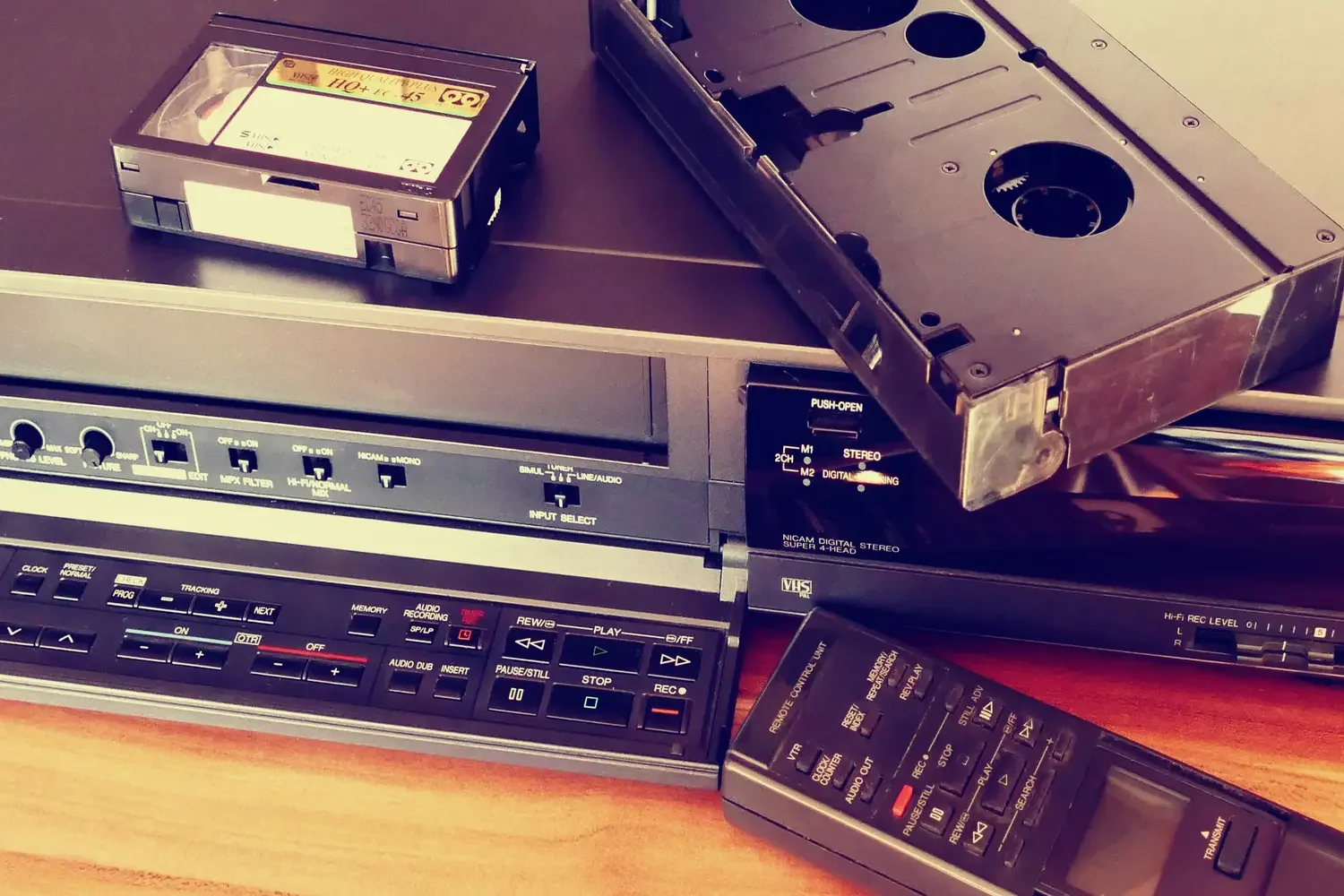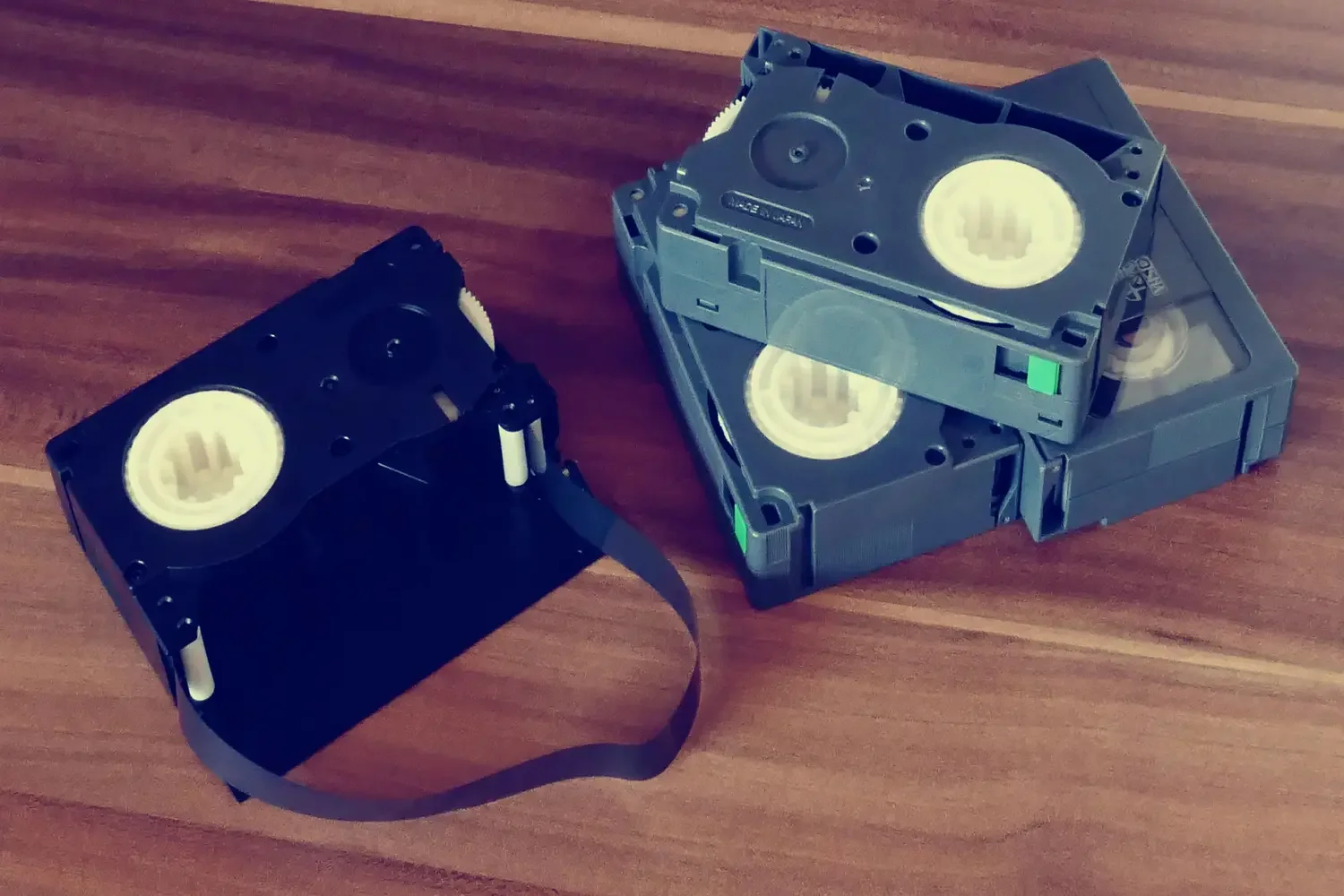
Transfer VHS-C Tapes to Digital & DVD
Professional VHS-C to DVD & Digital Transfer in Fairfield County, CT
If you've got VHS C tapes from the 80’s and 90’s stashed away somewhere, chances are you haven't been able to watch them in years - and that footage is just sitting there, slowly degrading.
We're based in Fairfield County, CT, and we specialize in transferring VHS-C camcorder tapes to DVD and digital formats. Those little cassettes might be small, but they're packed with big memories - your kids growing up, family celebrations, vacations you still talk about, all those everyday moments that turned out to matter more than you realized.
Here's what we do: we take your VHS C tapes and convert them into formats you can actually use today. Want digital files you can watch on your phone or computer? Done. Prefer DVDs you can pop into a DVD player? We've got you covered. And if some of your tapes are damaged or won't play right, we can repair them and rescue that footage before it's lost for good.
We serve families throughout Norwalk, Westport, Stamford, Fairfield, Darien, Bridgeport, New Haven, and beyond with free pickup and delivery in our local area. The reality is those tapes won't wait forever. Getting them transferred now means you can finally share those memories with family, back them up safely, and stop worrying about whether they'll still be playable in a few years.
We also work with other vintage video formats - standard VHS, 8mm and Hi8, MiniDV - so if you've got different types of tapes mixed together, we can handle your entire collection.
VHS-C Video Tape Conversion & Pricing Options
STANDARD TRANSFER
$29.99
PREMIUM TRANSFER
$39.99
Choose a transfer that’s right for you
Not sure which type is best for your needs? Get in touch today and we’d be happy to help you decide!
or call us on (203) 208-9447
Bulk discounts
When you have a whole lot of memories…
10% OFF
6-19 tapes =
20% OFF
20+ tapes =
-
You pick whichever format works best for you and we’ll do the rest.
If you need both files and discs, just add $15 per item.
-
A free 30-day, unlimited download and sharing link (up to 100GB in size)
All of our orders for digital files come with a free download and sharing link so you can share your memories with as many family members and friends as you like.
Need longer than 30 days? We can store your files indefinitely for just $5 a month.
-
If your tapes have labels, we’ll transfer those titles onto your files and discs, making it easy to find exactly what you’re looking for.
Got dates on them? We’ll do our best to sort everything in chronological order. No extra charge, no extra hassle.
-
Video tape audio can often be much quieter than expected, making it difficult to hear what’s going on.
We carefully amplify the signal to improve clarity and bring the sound back to a more natural level, without distorting it.
-
Our video files are provided as high quality .MP4 files as standard (the most compatible format), so you can take them anywhere and load them on any device.
What's Included in Every Transfer
-
$10 per tape
Video tapes often come with unwanted hissing and humming that can be a real distraction.
Our service reduces as much of that noise as possible while keeping everything else intact, so you can focus on the moments that matter, not the background buzz.
-
$10 per tape
Older TVs didn’t show the entire video frame, leaving black borders around the footage. Now, with larger, high-resolution screens, those borders are visible and can look messy.
If you want a cleaner, more polished video, this service is for you.
-
$10 per tape
Over time, video tapes naturally degrade, causing the picture to fade, a process known as “Tape Decay.”
We use specialized techniques to restore some of that lost clarity and bring your memories back to life.
-
$10 per splice
If your tape or reel has snapped and just needs splicing back together, the doctor is in!
-
$30 per tape
For more major repairs like rehousing or re-spooling your tape, this is our most comprehensive repair service.
-
If the audio on your tape needs more TLC than just equalization, our experts are here to work their magic.
With decades of experience, we’ll bring clarity, warmth, and life back to your tapes, making them sound their absolute best.
See our Audio Restoration page for pricing
-
All our orders come with a free download and sharing link, but if you’d like to add a USB drive to your order, we can get the right size for the media you have.
Our prices start at $12 and we can let you know how large a drive you’ll need.
Professional Add-On Services
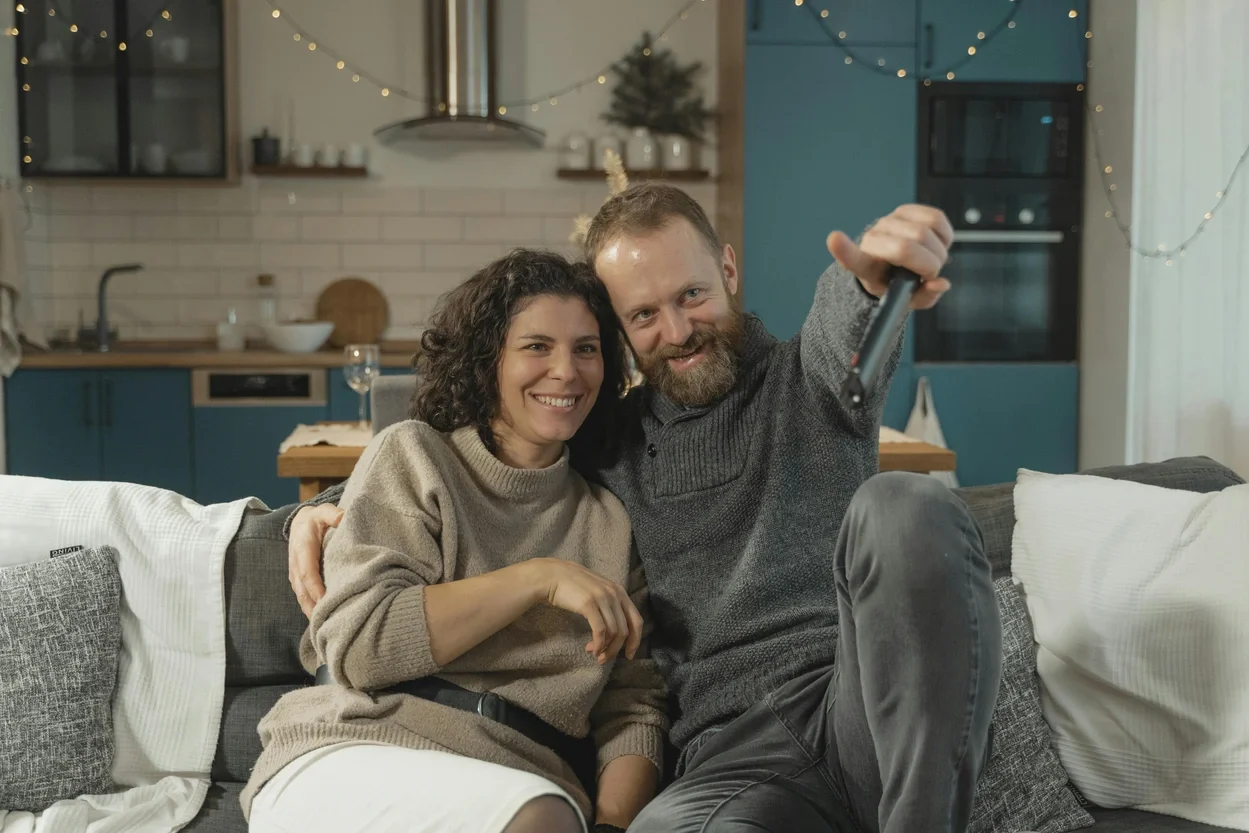
“Don’t look anywhere else. Choose Remember Whenever. You won’t regret the decision. Paul is excellent to work with. He is incredibly professional, honest, and communicative.
He digitized ten VHS-C tapes for me, and the result was incredible. He enhanced the color, contrast, and sound.
He finished everything in less than a week. He picked everything up and dropped it back off.
Working with Paul is easy and convenient, which was a huge relief given that he's handling treasured memories.”
- Sarah M.
Why Choose Remember Whenever for Converting VHS-C Tapes
Get it done once and get it done right - enjoy your family memories forever
Get the best, first time.
Quality work done by quality people
Only the best transfers, performed by expert technicians, using professional equipment.
30-day cloud storage & link sharing
Free download and sharing link with every order, so you can share your memories with as many family members and friends as you like.
Compatibility guaranteed
High quality .MP4 files as standard (the most compatible format), so you can take them anywhere and load them on any device.
VHS-C Transfer Questions - Answered
Got questions about converting your VHS-C tapes? Here are the answers to what most people ask us. Can't find what you're looking for? Give us a call at (203) 208-9447 or check out our main FAQ page for more info.
-
Most VHS-C tapes can still be played if you have the right equipment - either a working VHS-C camcorder or a VHS VCR with a VHS-C adapter.
Even if you have the gear, those tapes have been degrading for decades, so getting them transferred sooner rather than later makes sense.
-
Our standard VHS-C transfer starts at $29.99 per tape, with premium transfers at $39.99.
We also offer bulk discounts - 10% off for 6-19 tapes and 20% off for 20 or more tapes.
If your tapes need repair work first, we handle that too.
-
We repair damaged VHS-C tapes all the time. Whether it's a snapped tape that needs splicing ($10), a damaged cassette shell that needs rehousing ($30), or playback issues, we can usually recover the footage.
Don't throw away a tape until we've had a chance to look at it.
-
Most VHS-C conversion projects are completed within a few days to a week, depending on how many tapes you have and whether they need repair work.
During busy holiday periods, turnaround might be a bit longer. We'll give you an estimated completion date when we pick up your tapes.
-
Absolutely. You can choose DVD, digital files (MP4), or both. If you want both formats, just add $15 per tape.
All digital orders come with a free 30-day download and sharing link so you can share memories with family.
-
Yes, with an adapter.
VHS-C tapes use the same recording format as full-size VHS, so you could play them in a standard VCR using a mechanical adapter sleeve that came with most VHS-C camcorders. But finding working VCRs and adapters these days is tough, which is why most people just get them converted to digital.
-
Yes, the recording quality is identical since they use the same tape technology. The only difference is the cassette size. Both formats degrade the same way over time, and both have the same analog video characteristics.
We do find that VHS-C tapes recorded in Long Play (or Extended Play) mode tend to be lesser quality.
VHS-C vs VHS - What's the Difference?
If you've stumbled across a box of old tapes and you're trying to figure out what you're looking at, here's the quick answer: VHS-C is basically VHS in a compact package.
VHS-C (the "C" stands for Compact) uses the exact same recording technology as full-size VHS tapes, just crammed into a cassette about the size of a deck of cards instead of that big bulky rectangle you remember from Blockbuster. JVC created VHS-C specifically for camcorders in the early '80s because nobody wanted to lug around those massive shoulder-mounted VHS cameras.
Here's what makes VHS-C different:
Same tape, smaller shell - The actual magnetic tape inside is identical to VHS, which is why you could play VHS-C tapes in a regular VCR if you had one of those mechanical adapter sleeves.
Recording time - Most VHS-C tapes recorded 30-45 minutes of footage (or up to 90 minutes in EP mode, though the quality took a hit). That's way less than the 2-6 hours you could get on a full-size VHS tape.
Camcorder-only format - VHS-C was purely for home recording. You'll never find a pre-recorded movie or rental on VHS-C - it was all about capturing your own memories.
Compatibility - Since it's the same format as VHS, the video quality and limitations are identical. Both degrade over time in the same way, both have that characteristic analog look, and both are becoming increasingly difficult to play back as equipment disappears.
So if you're wondering whether to get your VHS-C tapes transferred - yes, absolutely. They're aging just like regular VHS tapes, and working playback equipment is getting scarcer every year.
From boxes in your basement to pictures on your screen
In four easy steps.
Contact us today to talk about your project and get a free, no-obligation quote.
We’ll come and pick up everything for free within our free pickup & delivery area ($1 per mile each way beyond).
Our expert techs will get to work on your project and they’ll be in touch if they have any questions.
Once we’re all set, we’ll let you know and schedule a convenient time to safely drop your newly digitized media back to you.
Free VHS-C Tape Pickup & Delivery Throughout Fairfield County
We make VHS-C transfer convenient with free pickup and delivery throughout our service area in Fairfield County and surrounding towns. No need to mail your irreplaceable memories to a distant company or drive anywhere - we come to you.
Towns We Serve with Free Pickup & Delivery:
We provide complimentary pickup and delivery service throughout Fairfield County, including:
Bridgeport • Fairfield • Westport • Norwalk • Stamford • Darien • Greenwich • New Canaan • Wilton • Weston • Easton • Trumbull • Stratford • Milford • Shelton • Monroe • Newtown • Redding • Ridgefield • Bethel • Danbury • Southport • Black Rock
Extended Service Area:
We also serve New Haven, Orange, West Haven, Woodbridge, Branford, and other surrounding Connecticut towns. Here is a map of our current free pickup and delivery area:
How Pickup & Delivery Works:
Contact us - Give us a call or fill out our online form to discuss your VHS-C transfer project
Schedule pickup - We'll arrange a convenient time to come pick up your tapes, completely free within our service area
Professional transfer - Our expert technicians handle your VHS-C tapes with care and get them converted to your preferred format
Safe return - We deliver your original tapes plus your new DVDs or digital files right back to your door
For customers outside our free pickup area, we charge just $1 per mile each way beyond the standard zone. We want to make sure families throughout Connecticut can preserve their VHS-C memories without hassle.
Ready to start your VHS-C tape transfer project?
Got VHS-C tapes that need transferring? Whether you want them on DVD, digital files, or both - and whether they're playing fine or need some repair work first - we can help.
We've been doing this for 14 years, and we know exactly how to handle VHS-C tapes to get the best quality without risking damage. Professional equipment, careful handling, and results you'll actually be happy with.
Call us at (203) 208-9447 or get in touch online. Let's rescue those memories before they're gone for good.

VHS-C Tape Repair Services in Fairfield County
Think your VHS-C tape is beyond saving? We hear that a lot, and honestly, most of the time it's not true.
VHS-C tapes are tougher than people think. Sure, they've been sitting in storage for decades, maybe in less-than-ideal conditions, and yes, some of them are going to have issues. But "won't play" doesn't automatically mean "can't be fixed."
We've repaired so many VHS-C tapes that families thought were lost causes. Tapes that got chewed up by old camcorders. Cassettes with snapped or tangled tape inside. Shells that won't open or close properly. Footage that looks scrambled or won't load at all.
Common VHS-C repairs we handle:
Tape splicing - If your tape has snapped or broken, we can splice it back together cleanly. You might lose a few seconds at the break point, but the rest of your footage is usually fine. ($10 per splice)
Rehousing and re-spooling - Sometimes the cassette shell itself is damaged, or the tape has come loose from the reels inside. We can carefully transfer your tape into a working shell or re-spool it properly. ($30 per tape)
Stuck or jammed mechanisms - Those little plastic parts inside VHS-C cassettes can fail over time. If your tape won't load or eject properly, we can often work around the mechanical issues or replace parts.
Playback troubleshooting - Sometimes what looks like a "dead" tape is actually just dirty playback heads or tracking issues. We've got professional equipment that can coax footage out of tapes that consumer gear can't read.
The point is this: don't throw away a VHS-C tape until someone who knows what they're doing has looked at it. Even tapes that seem completely trashed can often be repaired and transferred successfully. And since that footage is irreplaceable, it's always worth trying.
All About VHS-C
VHS-C Tapes: The Compact Powerhouse of Home Video Recording
If you grew up in the '80s or '90s, you probably remember someone in your family wielding one of those rectangular camcorders at every important event. Birthday parties, graduations, family vacations - there was always that one person trying to capture everything on tape while everyone else tried to act natural or shouted “stoooop” and tried to hide.
Those cameras almost always used VHS-C tapes. While your family's collection of regular VHS movies took up half the entertainment center, these compact cassettes were small enough to actually travel with you. They held about 30 minutes of footage, which sounds short but since they were much smaller than their regular VHS predecessor, we gave them their chance.
The "C" stood for "Compact," and that was really the whole point. Finally, families could record memories without needing a camera that felt like carrying a briefcase. VHS-C made home video recording something normal people could actually do without special training or a strong back.
And somehow, those little tapes managed to capture some of the most precious moments in family history.
The Birth of VHS-C: Small But Mighty
In the early '80s, making home movies was kind of a nightmare. Your options were basically carrying around a VHS camcorder that weighed as much as a toaster oven, or dealing with Sony's Betamax cameras that were slightly smaller but still made you feel like you needed a gym membership just to film your kid's soccer game.
JVC saw all these frustrated families and decided to fix the problem. They introduced VHS-C in 1982 - essentially regular VHS technology crammed into a much smaller cassette that could fit in a reasonably-sized camera. Here's where it got clever: you could pop these mini tapes into your regular VCR at home using a basic plastic adapter that came in the box. Sounds simple now, but back then it was pretty brilliant. All of a sudden, regular people could film family events without needing to be professional camera operators or weightlifters.
The tapes were small, the cameras were manageable, and you could watch everything on the same TV where you watched your rental movies.
The Downfall of VHS-C (2000s and Beyond)
Like most technology from the '80s and '90s, VHS-C eventually got steamrolled by progress. By the late '90s and early 2000s, digital everything was taking over. MiniDV cameras started showing up that could record way longer and with better picture quality. Then DVD camcorders arrived, and suddenly you could burn your home movies directly onto discs that looked way better than anything VHS-C could manage.
The real nail in the coffin was the rise of memory cards and hard drive camcorders. Why mess around with 30-minute tapes when you could record hours of footage on something the size of a postage stamp?
By the mid-2000s, VHS-C camcorders had pretty much vanished from store shelves. The format that had revolutionized home video recording just couldn't keep up with a world that wanted everything to be digital, longer-lasting, and easier to share. Those little compact cassettes that had seemed so advanced suddenly looked as outdated as everything else from the analog era.
VHS-C Tape Facts
-
In 1983, Sony introduced the Betamovie BMC-100P, the world’s first consumer camcorder, which recorded directly onto Betamax tapes. However, the Betamovie had a major limitation in that it lacked playback capability and required a Betamax VCR to view footage. Seeing an opportunity to dominate the emerging camcorder market, JVC responded in 1984 with the first VHS-C camcorder, the GR-C1. Unlike Sony’s Betamovie, JVC’s VHS-C camcorder offered both recording and playback capabilities, making it far more convenient for consumers. Additionally, VHS-C tapes could be played in standard VHS VCRs using a simple adapter, giving JVC a significant edge in usability. This strategic move helped VHS-C establish itself as a strong competitor to Sony’s Video8 format, which arrived the following year in 1985.
-
Although most VHS-C tapes were labeled for 30-45 minutes of recording, some camcorders had an EP (Extended Play) mode, which could triple the recording time. The downside? The video quality dropped significantly, and the tapes became more prone to stretching and damage.
-
Long before TikTok and Instagram filters, some high-end VHS-C camcorders had built-in effects like sepia, slow motion, fade transitions, and even digital text overlays. A few even allowed for basic animation, making home videos way more creative.
-
Ghost hunters and UFO enthusiasts often preferred VHS-C camcorders over digital because of analog tape's ability to capture subtle visual distortions that some believed were signs of paranormal activity. Purely speculative, but isn’t it all?
-
Since VHS-C tapes were often reused, many have fragments of old recordings buried beneath newer ones. Some people digitizing their tapes have discovered forgotten footage, like childhood birthdays, holiday gatherings, or even mystery clips from previous owners if the tape was secondhand.
Transfer Your VHS-C Tapes Before They're Gone
VHS-C tapes don't last forever - nobody designed them to sit in storage for 30+ years. The magnetic tape inside naturally breaks down over time, leading to grainy footage, washed-out colors, audio problems, or worse - tapes that simply won't play anymore.
If you've got VHS-C tapes stored away, this is your reminder to get them transferred. We specialize in converting VHS-C tapes to DVD and digital formats throughout Fairfield County, CT - and if your tapes are damaged or won't play properly, we offer repair services to recover that footage before it's permanently lost.
We serve families throughout Bridgeport, Darien, Black Rock, Stamford, Norwalk, Westport, Southport, Shelton, Milford, New Haven, and beyond with free local pickup and delivery.
Professional VHS-C Transfer & Repair Services
That footage of your kids' first steps, your parents' wedding anniversary, family vacations, holiday gatherings - all of it matters. Whether you need standard VHS-C to DVD conversion, digital file transfers, or repair services for damaged tapes, we handle every project with care.
Contact us today to transfer your VHS-C tapes to DVD or digital files. Call (203) 208-9447 or get your free quote online. Don't wait until those memories are gone for good.
